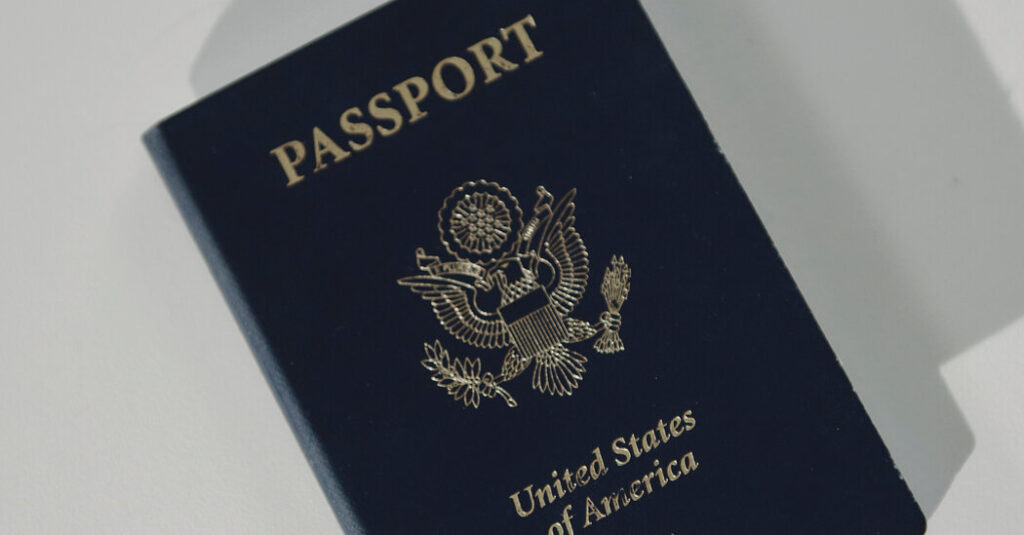The Trump administration has pushed for restrictions on transgender Americans in nearly every arena, including serving in the military and playing on sports teams, but perhaps no measure has struck as broad and direct a blow to their identity and participation in public life as a new policy on passports that the Supreme Court this month allowed to take effect.
Passports must now reflect the sex on a person’s original birth certificate, regardless of whether that matches the person’s gender identity. The policy reverses the State Department’s decades-old practice under both Democratic and Republican administrations of allowing transgender Americans to change the “F” and “M” markers on their passports. The department also removed a more recent option, “X,” for those who do not identify as either male or female.
Earlier this year, a federal judge blocked the policy from taking effect, siding with transgender and nonbinary plaintiffs who said it violated their constitutional right to equal protection. But the Supreme Court granted the Trump administration’s request to allow the policy while a legal challenge continues, saying that “the government is merely attesting to a historical fact” when it requires a passport to show a transgender person’s sex at birth.
To people on both sides of debates over transgender rights, the passport marker question is foundational. The marker gets at the nature of transgender identity itself, rather than addressing a specific activity, and confers a designation from which other rights and restrictions flow.
The passport is a singular document, “attesting to the identity and nationality of the bearer,” according to State Department regulations, so its approach to transgender people may define — more than access to bathrooms, athletic leagues or cross-sex hormone medication — what it will mean to be a gender-nonconforming citizen of the United States.
“This is one of the most tangible, material things that Trump has done to every transgender person who is living in a sex different than their birth sex,” said Paisley Currah, a political scientist at Brooklyn College who is transgender and wrote a book that traces the history of gender markers on government identification documents. “It makes the identity document not work for its intended purpose, which is to prove who you are.”
In a Gallup survey this year, a majority of Americans said they favored including the sex on a person’s original birth certificate on government documents. People who favor the administration’s new policy say that it is important for the sex marker on a passport to reflect what they see as an essential truth about its holder. They say that gender identity — how people see themselves in terms of being male, female or something else — is, by contrast, a quality that relies on self-attestation, which may be shaped by social trends and can shift over time.
“Passports should identify people based on verifiable facts, not subjective feelings,” said Roger Severino, vice president of domestic policy for the Heritage Foundation, a conservative group. “President Trump has restored common sense and objective biology to America’s pre-eminent IDs, which will increase security and prevent fraud.”
Proponents also see the policy as the first part of a larger effort to bar trans girls and women from bathrooms, public housing and prisons designated for females, which they say is important for safety, and from women’s sports, which they say is important for fairness. The executive order directing the State Department to carry out the policy, issued on the first day of the second Trump administration, asserts that women in the United States have been deprived of “their dignity, safety and well-being” by “ideologues who deny the biological reality of sex,” and vows to “defend women’s rights.”
Critics of the passport policy say the effects of the change are practical and far-reaching for nearly all trans and nonbinary Americans, a group that is estimated to be about three million people, or about 1 percent of the population age 13 and older. The new requirement could create confusion and allegations of misrepresentation, they said, for people whose appearance may not match the sex marker on their passport when using it to travel, open a bank account or apply for a job.
“This is, in my view, the most egregious thing the Trump administration has done,” said Brianna Wu, a political fund-raiser who has had an “F” on her passport for at least 15 years but who expects that she will be required to receive an “M” when it expires. “A trans woman in sports understands that they’re kind of playing on the edge of something. But this makes me out myself every time I use my passport. It universally affects us.”
For many trans Americans, the policy feels like a blunt, official declaration that the federal government views their gender identities as neither real nor meaningful, and it raises the prospect that such views will spread.
“What this says is that you, as a transgender person, do not matter to the state, and the state gets to tell you who you are,” said Imara Jones, a transgender journalist who runs a media company, TransLash. “This is not in accord with the way that citizens and citizenship has been treated in America.”
United States passports did not include a sex marker until the 1970s. Starting in the early 1990s, the State Department allowed transgender people to change the sex marker on their passport if they provided evidence of surgery. In 2010, the department began accepting a doctor’s letter stating that an applicant had received appropriate treatment for gender transition, which did not need to include surgery.
That requirement was eventually phased out in favor of self-attestation, and in 2021 the department issued the first passport with an “X” marker to a military veteran who identified as neither male or female. The next year, the Biden administration indicated that it would allow passport applicants to choose “M,” “F” or “X.” On passport application forms, the administration also replaced the term “sex” with “gender,” according to court documents. (The term “sex” has now been reinstated on applications for passports.)
Lawyers for the Trump administration argue that the new policy is not discriminatory because it treats transgender people the same as other Americans, requiring everyone’s passport to reflect the sex on an original birth certificate. The intent, the lawyers said in court documents, is maintaining consistent data on sex across government agencies.
Government-issued identity documents can serve as a parameter in policies that determine eligibility to participate in sports, use bathrooms and decide other issues. State governments have adopted a patchwork of policies for changing sex designations on driver’s licenses and birth certificates, so the passport has taken on particular significance.
“It’s really important that we be honest and factual about who the women are and who the men are,” said Kara Dansky, a spokeswoman for Women’s Declaration International USA, a group that advocates excluding trans women from the category of “women” in the context of women’s rights. “There are real, tangible reasons why it’s important to get this right when it comes to passports.”
Some opponents of the passport rule argue that gender identity — rather than sex on a person’s original birth certificate — is their sex. They say they want the sex on their passport to reflect the sex they live their lives as, and to enable them to use their passports the way other Americans do, without facing another layer of questions at airports and elsewhere about their personal lives. The policy, critics say, also fails to account for a small group of intersex people with biological variations that do not fall within the standard male and female classifications.
The passport change is part of what the Trump administration says it sees as a way to dismantle “gender ideology,” which it has characterized as policies and beliefs that conflict with empirical realities about sex. The strategy has won support from some across the political spectrum who felt strong-armed during the Biden era to call trans women “women” and trans men “men,” to include trans athletes in girls and women’s sports or to use the word “sex” to mean “gender identity.’’
In the Trump administration’s paradigm, gender “ideology” stands in contrast to an understanding of biology that divides nearly all animal and plant species into males with small, mobile reproductive cells and females with large, immobile ones.
But for many transgender people, the passport change feels more like an attack on them as people, not a debate about ideology around science or language. It suggests, they say, that their self-representation is intrinsically fraudulent.
One transgender woman, a former deputy director of a cultural organization in New York who spoke on the condition of anonymity out of fear for her safety, said she was stunned to suddenly feel, in her 50s, that her status as a United States citizen was somehow tenuous. She travels back and forth in business class to a second residence in Spain, and said she now worried intensely about her flights home.
She carries extra documents: a copy of her state driver’s license with her updated name and gender; her original birth certificate, which describes her as male; and a printout from the State Department website stating that the “F” gender marker on her passport remains valid until it’s due for renewal. Even so, she said she was scared that her passport might be confiscated on one of her returns to the United States. Last week, the State Department updated the page she had printed to say that a passport that lists an “X” marker or a sex other than the holder’s sex at birth would be valid “until its date of expiration, until you replace it, or until we invalidate it under federal regulations.”
“I’m like, I’m an American — why do I feel like this?” she said.
Polls show that many Americans want to protect trans people from discrimination, but that Americans also believe that society has gone too far in accommodating them.
In a survey conducted by Gallup this year, about two-thirds of people said they believed that transgender athletes should be limited to playing on sports teams that match their birth sex. A similar proportion said a person’s birth sex, rather than gender identity, should be listed on government documents. In a Pew Research poll in February, 56 percent said they supported banning health care professionals from providing gender transition treatments to minors.
President Trump, who came into office promising to “stop the transgender lunacy,” has aggressively pursued the issue in ways that reach far beyond passports. He has sought to withhold federal funds from schools that let trans athletes play on girls’ and women’s sports teams, bar transgender people from serving in the military, end funding for hospitals that provide treatments to minors, house transgender women in federal prisons with men, and eliminate mentions of transgender people from sex education curriculums in public schools.
Even some critics of other issues promoted by trans advocates have raised questions about the passport policy. Alex Byrne, a philosophy professor at the Massachusetts Institute of Technology who has argued that trans women are not women and that medical transition for minors carries underappreciated risks, wrote in an online magazine, Fairer Disputations, that “it is understandable that someone seeking peace of mind by living as a member of the other sex would want a sex marker to match.”
“The problem with pushing the pendulum too far in one direction,” Dr. Byrne wrote, “is that it will tend to swing too far in the other.”
As a class action against the passport policy by transgender and nonbinary people plays out in the courts, many trans people say they are wrestling with the immediate effects on their lives.
Many people interviewed said they had no intention of changing or hiding their own gender identities. Some said they were weighing moving to other countries; Joshua Harrell, 26, a nonbinary automation engineer, moved to Finland out of concern for safety in the United States. Others said they were still sorting through all the implications and taking precautions when they travel.
When Jay T. Conrad, 36, a nonbinary Ph.D. student in Seattle, and Dana Savage, a trans lawyer who lives nearby, travel across borders now, they call each other just before going through security and then once more after clearing it. Sometimes, they leave the phone connection open for the whole process.
“We consider the freedom to travel to be such an inherent human right,” said Jay Conrad, who worries about new scrutiny over a Washington State driver’s license, which shows an “X,” not matching their passport. “To be able to move where you want to move. Can I travel freely? It feels like a question to me. And is it really freedom of movement if it feels like a gamble?”
Seamus Hughes contributed research.
Amy Harmon covers how shifting conceptions of gender affect everyday life in the United States.
The post New Passport Rule Sends Blunt and Sweeping Message to Trans Americans appeared first on New York Times.




